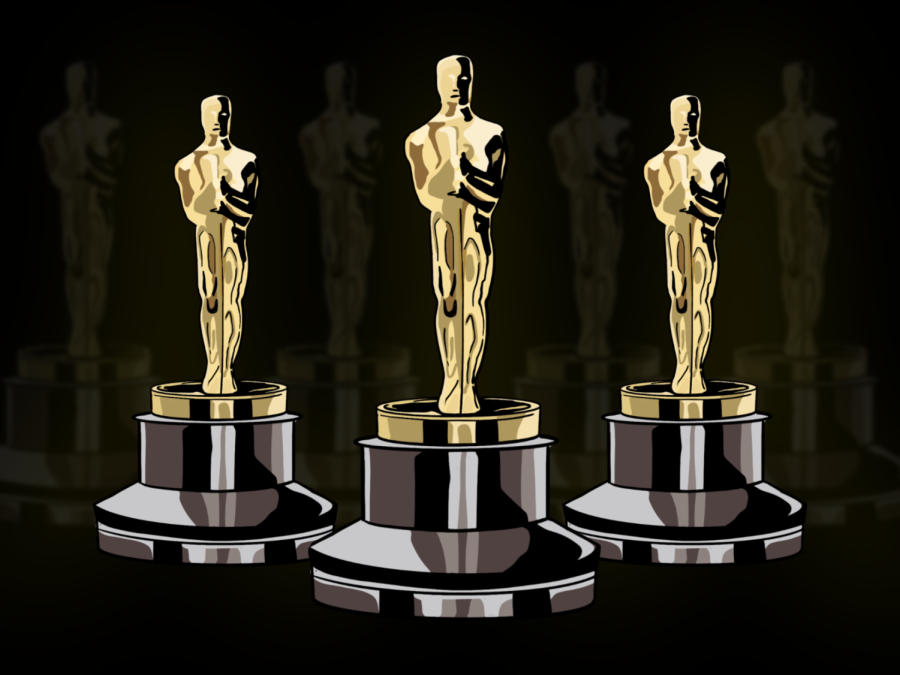This year’s Oscars hit different
The 94th Academy Awards were a harrowing milestone for streaming services, an ultimate victory for “CODA” and the slap heard around the world. Also: a full list of winners.
The 94th Academy Awards aired live on Sunday, March 27, marking a historic rebound in viewership with a 30% increase from the previous year. (Staff Illustration by Susan Behrends Valenzuela)
On Sunday, 15.4 million viewers tuned in for one of the wildest nights in Oscars history. The night marked a historic rebound for the Academy, with the show drawing in a 30% bump in viewership over last year’s all-time-low of 9.85 million viewers.
The award ceremony, held in the Dolby Theater in Hollywood, was hosted by Regina Hall (an NYU alum), Amy Schumer and Wanda Sykes, whose comedic sets — some bordering on sketch comedy — replaced air time for eight crucial categories such as film editing, original score and production design. The controversial decision to dismiss those award categories and replace them with less important comedic content was part of a larger initiative from the Academy to make the show’s three-and-a-half hour runtime more digestible.
Performed in tandem with the hosts’ comedic sets were a handful of celebrity cameos, which were unified by the theme “Movie Lovers Unite” — a cheap motif that, despite giving the ceremony the tone of a theme park at times, gave way to some entertaining reunions of iconic film casts. To celebrate the 28th anniversary of “Pulp Fiction,” the show assembled stars Uma Thurman, Samuel L. Jackson and John Travolta to spend a moment reflecting on the film. Sean “Diddy” Combs introduced Francis Ford Coppola, Robert DeNiro and Al Pacino, who took to the stage to celebrate the 50th anniversary of their masterpiece “The Godfather.”
The ceremony also included a moment of silence held to show solidarity with Ukraine. The Academy displayed a statement onstage during the pause: “While film is an important avenue for us to express our humanity in times of conflict, the reality is millions of families in Ukraine need food, medical care, clean water and emergency services.” The segment evoked a thoughtful silence from the audience and viewers around the world.
Acting, directing and Best International Feature Film awards
There were few surprises in major awards categories. Best Director went to Jane Campion — the third woman to win the award — whose stirring western “The Power of the Dog” was the most nominated film of the night. Jessica Chastain (“The Eyes of Tammy Faye”) won for best actress. Ariana DeBose won best supporting actress for her role in Steven Spielberg’s remake of “West Side Story.” She gave an emotional speech and became the first openly queer woman of color to win an acting award.
Best International Feature Film went to Ryusuke Hamaguchi’s stunning “Drive My Car.” Though its four nominations on Hollywood’s biggest stage certainly marked an important moment for Japanese film, Hamaguchi’s was sadly the only foreign film that received any notable attention. Joachim Trier’s “The Worst Person in the World,” a Norwegian film met with similar critical acclaim, was only nominated in two categories — its lead actress and best asset, Renate Reinsve, was not even nominated for best actress. The Danish animated “Flee,” the first movie to be simultaneously nominated in the documentary, animated and international feature categories, also ended the night with zero wins.
“CODA” wins best picture, marking a new era of streaming domination
“CODA,” Siân Héder’s portrait of a deaf family, took home the best picture award after a hard-charging last-minute awards campaign by its distributor, Apple TV+. It was a bittersweet moment for the film industry, perfectly displaying the benefits and pitfalls of streaming corporations’ growing dominance.
On the one hand, the last-minute awards campaign that pushed the beautiful “CODA” onto film’s biggest stage gave an unprecedented recognition to the Deaf community, which sits at the heart of the film. Troy Kotsur’s award for best supporting actor made him the first deaf man to receive an acting Oscar. On the other hand, it must be noted that “CODA” is the first film distributed by a streaming service to win the award for best picture.
One cannot help but worry about the small, independent distributors who lost to Apple in bidding wars for the film, subsequently losing out on revenue to fund other groundbreaking film acquisitions. “CODA” and its best picture win show that filmmakers can now rely on large companies like Apple, Netflix and even Amazon to find funding and a commercial audience. The danger is that this new pipeline may begin to value commercial viability over artistic vision as soon as streaming platforms feel comfortable enough with their hold on the industry. Not to mention added pressure to the already grim future of theatrical moviegoing — backed by subtitles to include Deaf audience members, “CODA” played a shockingly limited theatrical window before returning to its permanent home on Apple TV+.
The Will Smith incident
Then there was the moment that will inevitably come to define the night: When Will Smith rushed the stage and, in an utterly classless display of narcissism, slapped Chris Rock across the face. Rock had made a lighthearted — albeit slightly questionable — joke about Smith’s wife, Jada Pinkett Smith. “Jada, I love you. G.I. Jane 2, can’t wait,” Rock said, referencing her buzzed head. Demi Moore shaved her head for her role in 1997’s “G.I. Jane.” Pinkett Smith is a documented sufferer of alopecia, a disorder that informed her decision to shave her own head in 2018.
Pinkett Smith rolled her eyes, offended by the joke. Her husband appeared to laugh at first. Yet, seconds later, Smith took the stage and dealt a blow that would effectively overshadow the entire event. When he returned to his seat, Smith continued to make a fool of himself, shouting the words “Keep my wife’s name out of your fucking mouth” and casting a deafening, awkward silence across the theater.
Smith did a tragic disservice to musician, director and Clive Davis faculty Questlove. His emotional acceptance speech for his ever-important documentary “Summer of Soul,” which Rock presented with glittery eyes directly after the altercation, was noticeably tainted by the rattled audience.
When Smith returned to the stage to accept the award for best actor — an award that had previously eluded him throughout his nearly 40-year career, despite two other nominations for “Ali” and “The Pursuit of Happyness” — he seemed to defend his actions, apologizing to “the Academy” and his “fellow nominees” but not to the victim himself, Rock.
“In this time in my life, in this moment, I am overwhelmed by what God is calling on me to do and be in this world,” Smith said, speaking through tears throughout most of his speech. “I’m being called on in my life to love people and to protect people and to be a river to my people.”
Apparently, God called upon Will Smith to become a perpetrator of assault, to leave an indelible stain on Hollywood’s most important night and to desecrate the remarkable life and legacy of Richard Williams, who Smith portrayed in the film “King Richard.” Conflicted and shocked, the late Williams’ daughters Serena and Venus sat in a far-away mezzanine, putting on plastic smiles when the camera shot in their direction.
A victory for Deaf communities haunted by the ascent of streaming services; a deranged egomaniac; a lack of recognition for foreign films in major categories. Are these signs of an industry in decay? Some might say yes. But the wild night is evidence that, after the setback of a pandemic, the Academy — and the theatrical film industry at large — is intent on making a bold return to the cultural zeitgeist.
Contact JP Pak at [email protected].

JP Pak is a CAS sophomore studying English and history with a minor in the business of entertainment. Originally from Denver, Co., he loves writing about...























































































































































